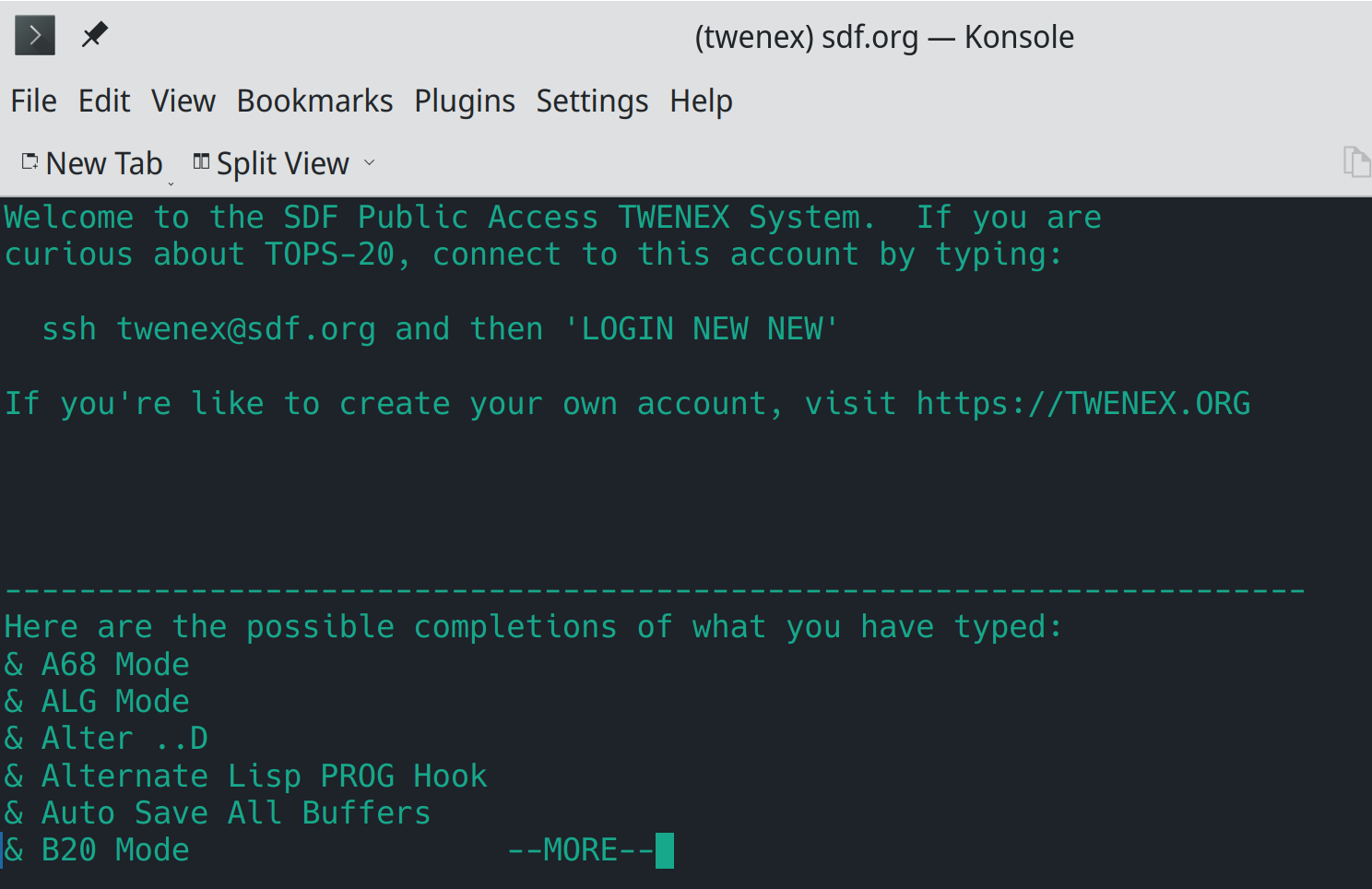Why do we hack?
Why do we hack? Because we enjoy it? Because we want others to use our work? Because we get paid?

Figure 1: “Teco Emacs on TOPS20” by George M. Jones is licensed under CC BY 2.0
Once again EmacsConf went to fountainhead of free software and gave us a chance to hear from and interact with rms.
People in the public eye often get on (or get put on) a soapbox repeating the same lines. Stallman even chose to open by playing an 8 year old TED talk he did extolling software freedom. Certainly not new, but once in a while it’s refreshing to return to primary sources rather than news or other mediated views. This talk and the Q&A was a view straight into the heart, soul and source of the Free Software movement.
I asked two questions on the webpad which Stallman answered. In both cases I was trying to get past the repeated soapbox points to what makes the person underneath tick.
Despite the utter profusion of tools built around the ecosystem he created over the past 40 years (just look at the program of EmacsConf and the contents of the *LPA archives), several of his comments lead me to believe he still views emacs as “just an editor”, so to clarify I asked:
Q: What do you use emacs for beyond editing?
A: I use it for reading and writing email; this is what I do most of the day. (Sings) “I’ve been answering my email, all the g**-d***** day / .. / <transcriber lost the thread about here [lyrics available at https://stallman.org/doggerel.html#IveBeenAnsweringMyEmail]
Which confirmed my suspicion about non-use of the ecosystem…. but a live performance of his own parody song about email? Score one for touching the human behind the troupe.
As someone who’s been around computers and Emacs long enough to have started using the TECO based emacs something like 3 years after RMS created it (c.a. 1979 for me), I look back fondly on some of the tech I’ve used (all of which included versions of emacs): TOPS20, TOPS10 (!), Multics, VMS, BSD Unix, SunOS, Solaris, etc and thanks to places like SDF and friends I can still log in and tinker in those environments once in a while. At EmacsConf 2020 Stallman waxed nostalgic for a moment about (I think) DDT (Dynamic Debugging Technique) or similar for a minute and the sense of control it gave, so this year I probed:
Q: Do you ever dabble in retro-computing, e.g. logging into TOPS10/20 systems SDF, etc?
A: No, I decided it’s a waste of time. It’s tinkering that would not develop anything of any importance or use. And I know if I’m going to enjoy developing something… I could enjoy developing anything… I decided not to distract my attention from useful computing.
So that’s revealing. It acknowledges the existential pleasure of creating, in any environment, but only values creations that are likely to be used by others.
I have a son who’s about to finish a doctorate in piano performance. Clearly it’s legitimate for him to perform for the enjoyment of audiences, that is “useful”. But I think it was also legitimate for him, a child, to sit down at the harpsichord in the hallway of George Washington’s Mount Vernon and to knock out baroque pieces for the sheer joy of it, I don’t think that was a “distraction” or “waste of time”.
A lot of what makes Emacs what it is, is the accretion of scratch-you-own-itch solutions (Org-mode, for instance) done for oneself and possibly the pleasure of just writing the code and making things work, and then shared as an afterthought. In this context GNU Emacs itself is now 40 years old and was at the time a re-implementation of a then 7 or 8 year old system (TECO Emacs) targeted to run on a re-implementation of a system (Unix) created in 1969. Today (much to my amazement) there are STILL people into the Amiga1, C-64s, and there are PDP-10’s that run on raspberry-pi’s. I once had an office-mate who “wrote” his own version of the Z80 in Verilog, because he could.
I appreciate the desire to have one’s software used widely, but I think its equally valid for people to do their own thing, possibly in nitch areas or on obsolete platforms, just because they want to. I’d even say these are prime examples of people exercising software freedom on their own hardware and, at least to them, this is “useful computing”.
Hat’s off to RMS for Emacs, GCC, Core Utils, the GPL, FSF, Free Software…
Happy Hacking !!!
#38 of #100DaysToOffload take 2.1, https://100daystooffload.com/
-
The Amiga was my first computer. I was the first person to port an Emacs editor to the Amiga, porting a version of what became “MicroEmacs” and mg to it and receiving a phone call from one of the core Amaga engineers at Commodore asking if they could use it after I posted to comp.sources.amiga ↩︎